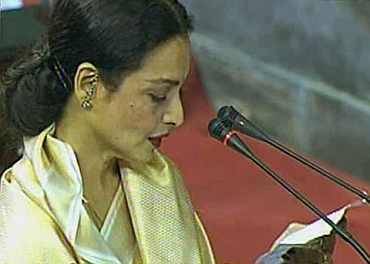On the surface, the Indian music industry seems
peaceful enough, steeped in glamour, and a perfect blend of melodies. Look
closer though and you'll see the rifts -- little fault lines that indicate a
strain in the relationship between artistes and music companies.
And this strain has come
to a head with the registration, of the Singers' Association of India, which
aims to tackle the "problems faced by the industry today."
Problems? Isn't this the
industry everyone wants to be part of -- an industry that has given us our
Indian Idol, Abhijeet Sawant, our desi crooner Rabbi Shergill, and that is
increasingly attracting global voices such as Trickbaby, Juggy D and Raghav, to
name just a few?
It's also the industry
where Pakistani artistes Junoon, Strings, Fuzon and, more recently, Jal and Ali
Zafar, are finding a firm foothold as they release albums to an increasing fan
following. A place for artistes to co-exist happily in, to live and let live?
This industry, which in
the 1990s boasted of a turnover of Rs 1,150 crore (Rs 11.50 billion), now
stands abysmally low at Rs 450 crore (Rs 4.50 billion). What's more, the notes
and melodies are shaky, out of tune and discordant as the industry is plagued
with controversies, discontent and a growing unrest between music companies on
the one hand, and music composers, lyricists and singers on the other.
In other words, strip
the music industry of its sheen and one finds a range of issues that need
urgent attention. As well-known playback singer and television anchor Shaan says, "It's easy to highlight the trends of the music
industry, but that's the glamorous part." A brief pause and he adds,
"Let's discuss the real story."
But what is the real
story? Different versions rest with different parties. While music directors,
singers and lyricists take a break from strumming their instruments to point
fingers at music companies for mistreating them, the latter have their own
ripostes. But whatever the disagreement, both sides agree that the issue of
piracy that has eaten into the music industry and left it hollow.
Technology has advanced
considerably and expanded the listeners' base, what with people downloading
music at a low cost. Music is easily heard on radio channels, music videos are
shown on television and people are happily listening to innumerable songs on
their MP3 players. However, this is precisely what has led to a considerable
decrease in the sales of the music albums.
Nobody, wants to buy music
cassettes or CDs any more because they're happily downloading music off the
Net, ( Yeah, even I do that!) this being one of the
prime reasons why the industry has bled profusely in the past few years. But
the damage is really heavy on the pocket. The industry has lost nearly Rs 450
crore to piracy.
But this is where the
duet between IMI and musicians ends, with both parties opting for a solo track
thereafter.
Take Singers'
Association of India (SAI), the association started by playback singer Sonu
Nigam along with colleagues Alka Yagnik
and Suresh Wadekar that, in the singer's own words, "is aimed at tapping
the real issues that music companies fail to address."
What could possibly
prompt Nigam, one of India's busiest playback singers, to make such a
statement? Take for example, If you hear the hit song 'Kajrare' from the film
Bunty aur Babli, it's called the Aishwarya-Amitabh-Abhishek
song. No one calls it the Shankar Mahadevan-Alisha Chinai-Jaaved Ali song. It's
such a wrong attitude, and that's what they are after changing.
I feel music companies
need to aggressively market singers, encourage the non-film music market, give
them their fair share of royalty and, essentially, "give singers due
respect”.
As long as the issue of
royalty remains unsettled, musicians will continue to be insecure. Music
companies, need to have faith in their artistes, and the industry on the whole
needs to be structured properly and give artistes their rightful share of
money.
The controversies
regarding royalty seem to be on the minds of almost everyone in the industry.
What's more, with technology advancing so rapidly, musicians want a share of
the pie on not just cassettes and CDs but also from radio and television
channels that air their songs, from sites that allow people to download music,
and from ringtones that are being downloaded at a rapid pace.
The industry orchestra
isn't likely to serve up too many winners if this issue isn't sorted out some time soon.
Maybe the Singers
Association will help mend the differences; maybe it'll fuel it further. Either
way, making music isn't going to be fun for some more time to come.

